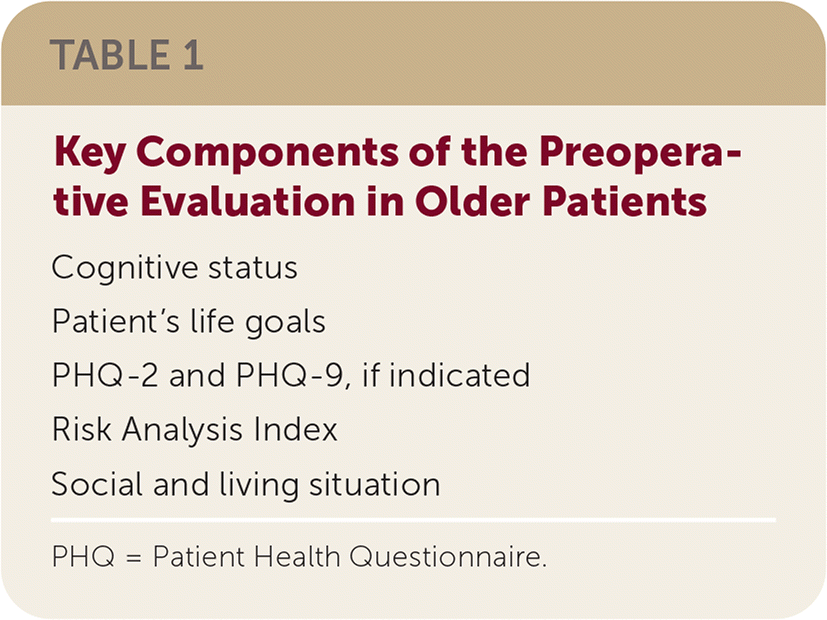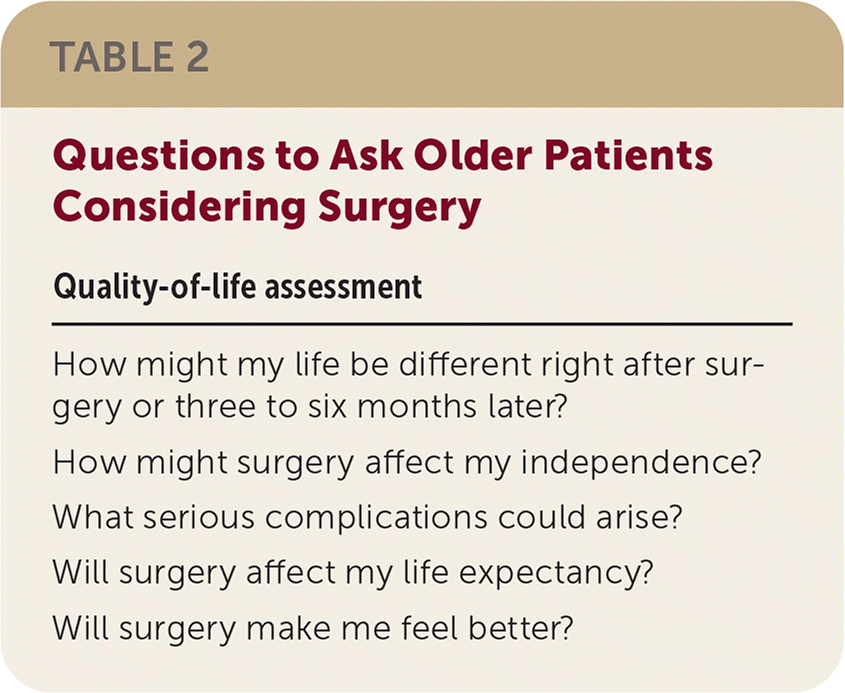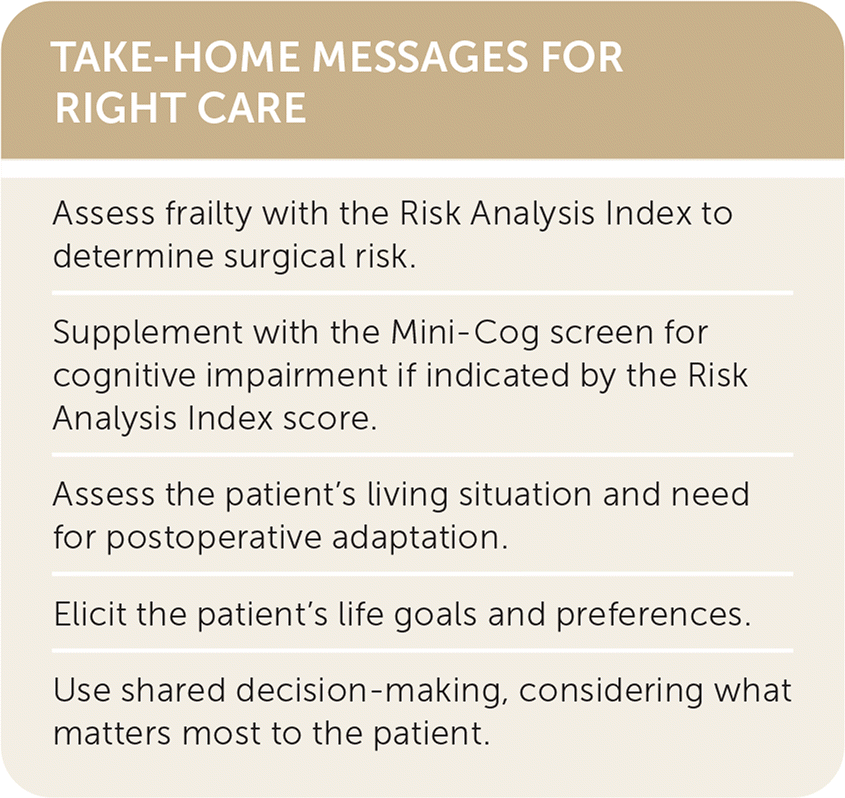
Am Fam Physician. 2020;102(12):753-755
Related article: Frailty: Evaluation and Management
Related letter: All Patients Undergoing Any Surgical Procedure Should Be Assessed for Frailty
Author disclosure: No relevant financial affiliations.
Case Scenario
Mr. M is an 80-year-old widower who lives in an assisted living facility. He has mild congestive heart failure and right knee osteoarthritis. Despite treatment with acetaminophen and a steroid injection from his primary care physician, increasing pain in his arthritic knee limits his ability to participate in yoga classes and walk for physical activity. He is not overweight and uses a walker for stability. He eats, toilets, and tends to his hygiene independently. During his appointment, he asks about knee replacement surgery. He mentions that his appetite is reduced, and he has lost 10 pounds since his last visit six months ago. His son, who accompanies him to the visit, says he has noticed his father has become more forgetful in the past three months.
Clinical Commentary
Knee replacement surgery is considered a moderate-stress procedure according to the Operative Stress Score.1 However, research suggests that the patient's preoperative health and function are more important considerations in estimating operative risk.1 Table 1 lists key components of the preoperative evaluation. Frailty is a term that describes patients, regardless of age, who have reduced physiologic reserve and are at increased risk of dying within five years. Patients who are frail and very frail who underwent lowest stress surgical procedures exceeded the 30-day mortality rate often used to define high-risk surgery.1 [corrected]

| Cognitive status |
| Patient's life goals |
| PHQ-2 and PHQ-9, if indicated |
| Risk Analysis Index |
| Social and living situation |
Frailty can be measured using the revised Risk Analysis Index, a validated tool with high predictive power for postoperative mortality.2 The tool takes less than two minutes to complete, using 14 variables including demographic factors (age, sex), comorbidities (presence of disseminated cancer, unintentional weight loss, renal failure, congestive heart failure, loss of appetite, dyspnea at rest, cognitive decline), facility residence, and level of independence in four activities of daily living. A Risk Analysis Index score of 30 or more out of a possible 81 points indicates frailty, and 40 points or more indicates the patient is very frail.3,4 All surgical procedures are considered high risk for patients who are frail and very frail.1
One of the Risk Analysis Index questions is, “Have your cognitive skills or status deteriorated over the past three months?” Minor and major surgeries can trigger a significant reduction in functional status for older people who are frail, especially people with cognitive impairment. The Risk Analysis Index is only modestly sensitive for mild cognitive impairment or dementia; therefore, clinicians who have a high index of suspicion should use a screening tool for dementia such as the Mini-Cog (https://mini-cog.com). Patients with dementia who are hospitalized are at high risk of iatrogenic harms, including delirium, long-term cognitive and functional decline, longer hospital stays, and greater risk of institutionalization.5,6 The combination of physical frailty and mild cognitive impairment is associated with a higher risk of adverse outcomes than either factor alone.7
Preoperative evaluation for depression using the Patient Health Questionnaire-2 (PHQ-2) and PHQ-9, if indicated, may identify additional risks of surgery, including increased risk of postoperative infection, chronic pain, and delirium.8
Adequate evaluation of the patient's living situation is important to assess the need for skilled nursing or rehabilitation placement or to plan a safe discharge home. Will someone be with the patient during surgical recovery? How will meals be provided? Are stairs an issue? How will bathing and toileting be accomplished? How will prescriptions be filled? Do the patient and caregiver know how to get questions answered? If durable medical equipment, such as a portable toilet or a hospital bed, will be needed, who will arrange for that ahead of time? Are there fall risks at home? Would a preoperative home visit by a nurse or physical therapist be helpful? Preplanning can facilitate safe return to the home and avoid prolonged hospital stays or temporary placement in a skilled nursing facility.
Few preoperative risk reduction interventions have been tested in surgical patients who are frail. However, pre- and postoperative exercise therapy appears to improve functional outcomes and quality of life after hip replacement or cardiac surgery.9 Preoperative evaluation of older patients can also enable a clinician to more accurately inform the patient and family about expected favorable or unfavorable outcomes of surgery and the alternatives to surgery. For example, when discussing joint replacement surgery, alternatives could include physical therapy, working on pain management, additional durable medical equipment, and alternate modes of physical activity. This sets the stage for shared decision-making.10 Identifying the patient's life goals will inform consideration of options, including avoiding surgery altogether (Table 2). Patients and their caregivers should be advised of the increased risk that even low-stress surgical procedures can pose for mild cognitive impairment, dementia, or overall frailty that would decrease independence and present a risk of institutionalization. In general, patients value their quality of life as much as survival.11

| Quality-of-life assessment |
|---|
| How might my life be different right after surgery or three to six months later? |
| How might surgery affect my independence? |
| What serious complications could arise? |
| Will surgery affect my life expectancy? |
| Will surgery make me feel better? |

| Assess frailty with the Risk Analysis Index to determine surgical risk. |
| Supplement with the Mini-Cog screen for cognitive impairment if indicated by the Risk Analysis Index score. |
| Assess the patient's living situation and need for postoperative adaptation. |
| Elicit the patient's life goals and preferences. |
| Use shared decision-making, considering what matters most to the patient. |
Patient Perspective
Although physical disability and cognitive impairment are among the most significant fears an older person can have, many prospective patients may not understand that disability, impairment, and worsened function are risks of surgery. This lack of information may underlie Mr. M's interest in elective knee surgery. The primary care physician has an essential role in helping patients and families understand surgical risk and the appropriateness of surgery for each individual. This role can be a reassuring one, as people may sometimes feel they need permission not to have surgery.
Given Mr. M's heart condition and potential surgical risks, he should be carefully assessed before considering knee surgery. His frailty assessment will be key to this decision. Moreover, having cared for older family members in the past few years, we salute the emphasis on shared decision-making and quality-of-life questions.
Mr. M and his son are understandably concerned about Mr. M's recent weight loss and possible cognitive decline. Regardless of Mr. M's decision on knee surgery, insights from this visit raise the need for follow-up to check for other causes of signs of decline and to make recommendations (e.g., nutritional supplements, memory exercises) that might help slow the decline.
The term “ frail” is sometimes misinterpreted as implying imminent dependence and death, and may be a source of distress to patients. Consequently, it may be more productive to discuss surgical risk and the Risk Analysis Index explicitly in relation to specific mental and surgical variables rather than using this emotion-laden term.
If Mr. M does not have surgery, he may be unable to continue participating in yoga and walking, which is likely to cause further physical and perhaps mental decline. If we were his family caregivers, we would inquire about physical therapy. This could be aquatic or nonaquatic therapy and might provide an additional activity for Mr. M to enjoy.12
Resolution of Case
Mr. M's Risk Analysis Index score was 47, indicating significant frailty associated with an increased mortality risk of 16% for an otherwise moderate-stress procedure.2,3 PHQ screening showed no depression. Mini-Cog results suggested mild cognitive impairment. The physician presented the general risks of surgery, including further loss of cognitive function, mortality risk of 16%, and the specific risks of knee arthroplasty such as transfusion, deep venous thrombosis, and prolonged hospital stay because of medical complications.
Although healthy 80-year-old patients generally do well and experience improvement in pain and function from knee arthroplasty,13 Mr. M has significantly higher risk attributed to his comorbid conditions. He decides he can live with the pain; he is happy with his current living situation and does not want to risk a long hospital stay and further impairment to his memory. Mr. M and his physician agree to follow up soon to review the decision and talk more about the Mini-Cog results.2
